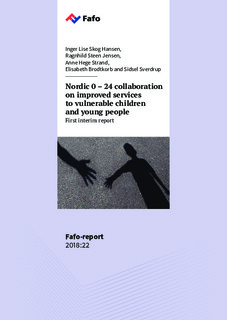| dc.description.abstract | The Nordic countries are known for their extensive welfare states producing high levels of welfare for their residents across the life course. Still, there are rising concerns related to the situation of vulnerable children and their fam-ilies, not least of which are the early school leavers and young people not in education, employment or training (NEET). In 2017, as a response to these challenges, the Nordic Council of Ministers initiated the Nordic 0–24 project. The overall agenda of the project is to prevent the social exclusion of vulner-able children and young people, and to prevent school dropout and future marginalisation in the labour market. The project’s aim is to improve services in the Nordic countries that are directed at vulnerable children and young people between the ages of 0 and 24 years by means of improving cross-sec-toral collaboration. The project’s starting point is that improved cross-sec-toral collaboration at the state, regional and municipal levels is necessary to provide more coherent, higher quality services.
The project comprises cases from all the Nordic countries (Denmark, Fin-land, Iceland, Norway and Sweden) and the autonomous islands (Greenland and Aaland)—the Faroe Islands participate in the Nordic 0–24 project, but without a specific national case. The cases serve as national examples of cross-sectoral collaboration in the delivery of services to the 0–24 age group. The Norwegian Directorate for Education and Training is in charge of the project management, and the project period will continue through 2020.
Fafo Institute of Labour and Social Research has, in collaboration with VID Specialized University, been assigned the task of carrying out a process eval-uation of the Nordic 0–24 project. In this first interim report from the process evaluation, we provide an overview of the evaluation’s design. Furthermore, we present a model developed to examine how the national cases may serve as sources for identifying factors that contribute to improved collaboration and more coherent service delivery for vulnerable children and young people. As a background for future analyses, the national policy context of the in-volved cases and relevant national welfare systems and services are also de-scribed. | nb_NO |
